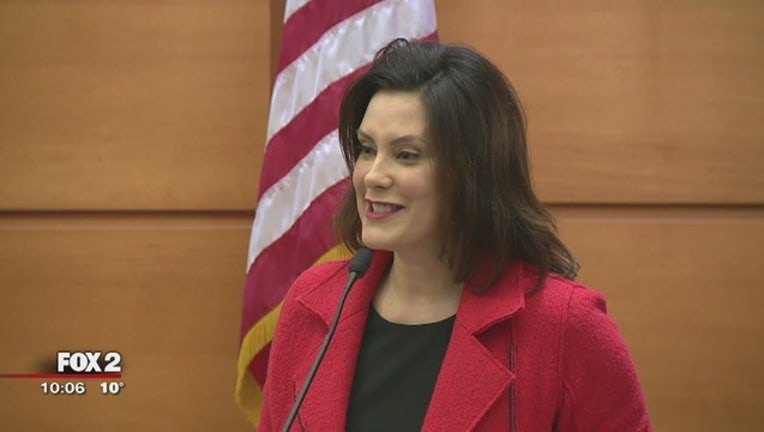Gov. Whitmer to outline gas tax hike, other budget proposals

LANSING, Mich. (FOX 2) - Gov. Gretchen Whitmer is poised to propose a 45-cents-a-gallon gasoline tax increase to improve Michigan roads and bridges that she says will deteriorate further without a major influx of new spending.
The Democrat will propose her first budget Tuesday at a hearing with lawmakers. She is expected to propose offsetting a portion of the tax hike with targeted relief for certain residents.
If the Republican-led Legislature backs Whitmer's plan - which will be a tough sell - Michigan would have by far the highest fuel taxes in the country.
LIVESTREAM:
Currently, Michigan's gas tax is $0.26 cents. Whitmer's proposal would increase the tax 15 cents in the first six months, 15 cents in the next six months, and then another 15 cents in the year after.
Gov. Whitmer says Michigan is at a "crossroads" and must make "bold investments" to turn around roads, schools and provide clean tap water.
Whitmer says people already are paying a "roads tax" because of vehicle repairs caused by potholes and if nothing is done, the roads will get worse.
To offset some of the additional tax burden, she wants to reverse a so-called pension taxed enacted in 2011 and give higher tax breaks to low-income earners.
Sticking to her campaign promise, Whitmer is hoping to fix the roads with a 45 cent gas tax that would be phased in over nine years.
Whitmer also will outline a $500 million boost in state K-12 spending , including extra funding to teach at-risk, special education, and career and technical students.
RELATED:
Whitmer gas tax proposal expected to cost $500-$700 per year
Gretchen Whitmer to propose increasing gas tax to $0.45 to fix roads
More information on the education spending is below:
- The plan will include $235 million in additional base aid along with $120 million more for special education, an extra $102 million for economically disadvantaged and other at-risk students, and $50 million more for career and technical education students.
- It will propose tripling the number of literacy coaches statewide from 93 to 279. Whitmer wants to drop a requirement that county-level districts split half of the cost, and instead have the state fund them entirely. The coaches have been hired in recent years to help local districts and charter schools in advance of a law that, starting next academic year, requires third-graders to be held back if they lag in reading.
- The minimum per-student allowance - which most districts receive, including charters - would increase from $7,871 to $8,051, a $180 increase. Districts at the higher end would get $8,529, or $120 more than the current $8,409 allotment.
- Whitmer will call for a new "weighted" K-12 funding formula to factor in higher costs for certain students. Funding for at-risk students would be distributed as a multiplier on top of the base grant. The new vocational funding would be apportioned similarly, while existing funds would be split as they are under current law.
- Whitmer's proposed boost on spending for at-risk students, to $619 million - a 20 percent increase - would be the third spike in five years. The funds help schools provide additional supports, such as tutoring and counseling, to low-income and other disadvantaged students who account for half of Michigan's 1.5 million students. The funding would equate to $894 per at-risk student, up from about $720.
- Overall spending on career and tech education, or CTE, would more than double to $109 million. Schools now get $25 for each ninth- through 12th-grader enrolled and another $25 for each student learning "critical skills." Districts could qualify for $487 per CTE student under Whitmer's budget. Whitmer has been emphasizing the need to better prepare people to enter the workforce.
- Michigan currently either reimburses districts for about 28 percent of the expense for a student with a disability, including 70 percent of transportation costs, or gives them the base allotment - whichever is greater. Whitmer's proposal would increase the reimbursement rate by 4 percentage points, to 32 percent. A 2017 state study found that special education students lagged behind children with disabilities in other states and the system was badly underfunded, forcing schools to divert nearly $700 million annually from their operating budgets to fill the shortfall.
Information from the Associated Press was used in this report.

